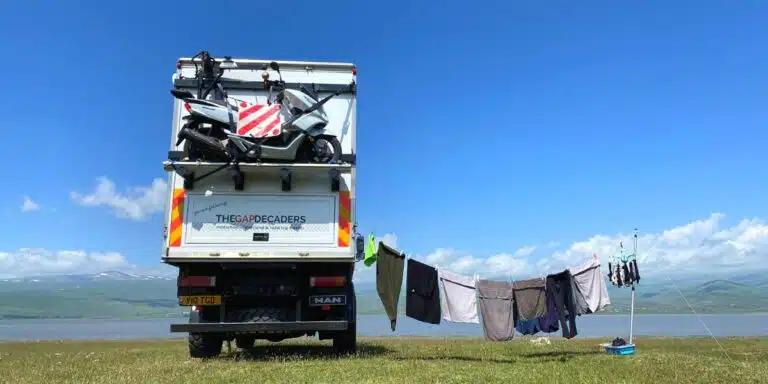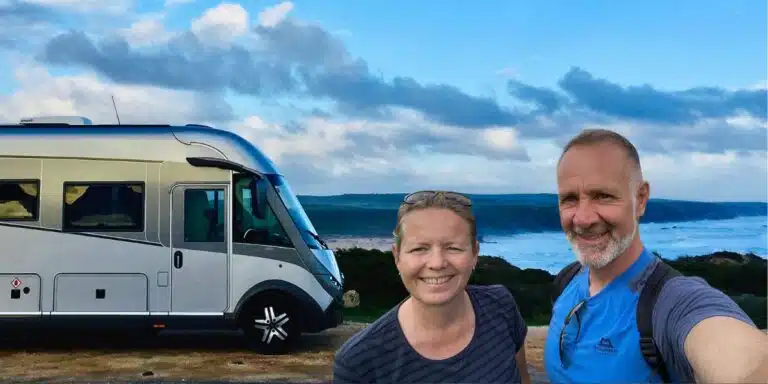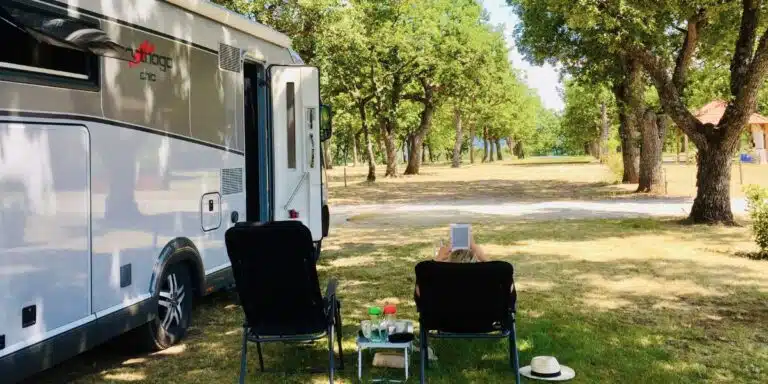This post may contain affiliate links, from which we earn an income. Click here to read our affiliate policy.
A Guide to Insurance When You Live in Your Motorhome
If you have sold, or are renting your property to live in a motorhome or campervan then you need to understand the ins and outs of motorhome ‘full-timing’ insurance.

Do I Need An Address?
If you buy a UK registered motorhome or campervan, then you will need to register it to a UK address. It makes sense to also change your driving license to whichever address you use for the registration of your vehicle.
We use my Mum’s address and in fact, it works really well as she can monitor any mail for us. We are on the electoral role at this address and pay the additional cost as Mum loses her single persons discount. We also have our bank accounts registered there and so maintain a credit footprint in the UK.
Responding to a Freedom of Information request regarding drivers of no fixed abode, the DVLA replied;
“It is not possible for the DVLA to issue a driving licence or a vehicle registration document unless we are provided with a residential address at which the driver and/or vehicle keeper can be contacted. This is required for law enforcement purposes by the Police and by DVLA.
Note: Post Office boxes are not considered viable address details as in the event of an emergency the authorities i.e. police would not have an address to contact the driver. Secondly it also increases the risk of fraud. Post Office boxes can be rented for a short time and the person then become untraceable.”
So PO Box and virtual addresses cannot be used for DVLA purposes and do not work for insurers either.
Definition of Full-Timing
Wikipedia says “Full-timing is a term used among motorhome individuals and families who live “full-time” in their motorhome”.
Simple really, but there is masses of mis-information on the internet and various forums about what it means for insurance purposes. When we started to full-time, I researched for many hours and days the insurance position and am now sharing the definitive answers with you.
Insurance Definition of Full-Timing
From an insurance underwriters perspective, you are full-timing if “use of your motorhome for nine months or more (whether as a single trip or series of trips) in any one year will be treated as long-term touring. If, in addition, you sell or let your UK property you will be treated as full-timing.”
“Policyholders must maintain a full UK residence, either through ownership or a long-term rental agreement (of at least nine months) unless a full-timing rate has been agreed and paid.
The address shown on the policy schedule must be the one at which the policyholder is on the electoral role (unless a full-timing rate has been agreed and paid) and also the one that appears on the driving license and vehicle documentation.
Should a copy of a utility bill (as evidence of residence at the address) be requested at any time (inception, mid-term, renewal, in the event of a claim) then one must be provided.”
Recommended Reads
Living in a Motorhome: Your Complete Guide to Motorhome Life
Motorhoming Tips for Beginners: Essential Know How for Motorhome Life
Arranging Insurance
Despite what others may say, there is only ONE motorhome full-timing policy available in the UK. The underwriter is Aviva and only a handful of brokers offer the policy.
Comfort Insurance and Adrian Flux are the two we have dealt with.
When we started to arrange our insurance for the first time, I must have spoken to about 15 different companies offering motorhome insurance.
It is important to really drill down into how long they will continuously cover you for, as many will say they can cover you and be deliberately vague about time frames; it’s only when you receive your policy documents that you find the information about full-timing or long-term travel.
Motorhome insurers do not really like full-timers, not only are you a greater risk as there is no-where for your van to be parked, but the risk heightens also as you are living in your van.
I have never really understood this, surely your van is safer when you live in it then when it’s parked on the road outside your house for months on end whilst you go to work everyday?
Make sure you read the small print when you get your documents. Be aware that if you are heading to Europe full-timing insurance will not cover you to leave your motorhome for more than 48 hours in a foreign country.
This means arranging secure storage which the underwriters must approve, and possibly paying and additional premium, to ensure you motorhome remains covered.
Another point to note is that if you cancel your policy half-way through, if you’ve decided that full-timing is not for you for example, Aviva will not revert your policy back to normal usage until you evidence that you have an address in the UK. This means providing a rental agreement, deeds or electoral role evidence!
How Will They Know?
Well, they might not. But if any of these scenarios apply to you, they will probably find out and the repercussions could mean its hard for you to find insurance in the future:
Any of these circumstances and many others too numerous to mention will make them prick up their ears and ask some testing questions. Remember that insurers love to deny claims; if they can prove that you have been full-timing and not declared it, your insurance will be invalidated.
We ummed and ahed with this as the difference in cost can be significant, but in the end, when we weighed up the value of our investment in our motorhome against the risk, we decided to come clean and be open and honest with our insurers.









I know – I do think the sector will catch up, but perhaps not for a few years yet 🙁 Hope you get sorted and good luck on the road Izzy
Don’t understand why it’s so complicated in 2024, so many people are deciding to “opt out” of society’s norm of 9-5 and bricks and mortar.
I’m so glad I came across this article as I had rang several companies who refused to insure without a fixed abode 😕.
I will give the 2 companies mentioned a call and 🤞🏻get insurance for my new lifestyle…
Best information that I have found in relation to full timing motorhome insurance in the UK.